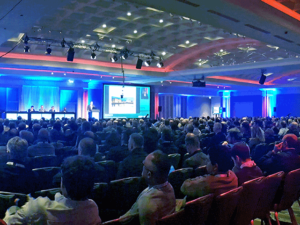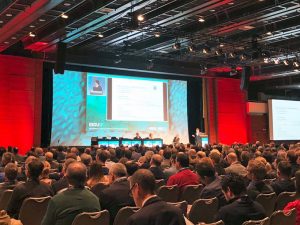By Prof. Maurizio Brausi
Azienda USL di Modena
Modena, Italy
New technologies and developments in diagnosis, treatment and follow-up in prostate, bladder, renal, testicular and penile cancers are some of the topics to look forward to at the 16th Meeting of the EAU Section of Oncological Urology (ESOU19).
The principal aim of this meeting is to further strengthen the onco-urology global community; give the participants the opportunity to connect, exchange new ideas and strategies in the development of knowledge; and innovate and improve patient care.
The meeting, which is set to take place in historic Prague from the 18th to the 20th of January 2019, will explore and investigate the benefits of multi-parametric magnetic resonance imaging (mpMRI) in the diagnosis of prostate cancer (PCa); new drugs in the treatment of muscle-invasive bladder cancer (MIBC) and renal cancer; the role of genetics in PCa; updates on checkpoint inhibitors; and bladder-sparing approaches in MIBC.
ESOU19’s Scientific Programme will also offer opportunities for debates, discussions and cutting-edge lectures such as using artificial intelligence in biopsy decision-making. A workshop on mpMRI interpretation for PCa treatment is also organised for the meeting. Participants can also expect insightful case presentations, and educational videos of robotics, laparoscopy, nephrectomy and more.
One of the most important characteristics of the ESOU meeting is its goal to involve and support young European urologists. Now in its 9th year, the successful STEPS (Sessions To Evaluate ProgresS in the management of urological cancers) programme will continue to boost links with promising young clinicians specialising in urological cancers. The programme allows selected young urologists to discuss cases with established international experts.
Join the ESU course
I highly recommend participating in the “The Treatment of Localized and Locally Advanced Prostate Cancer” course by the European School of Urology (ESU). The course aim is to provide practical tips and tricks, taking into account the most recent developments in the field. During the course, the management of recurrent disease will be reviewed, and the ability of new developments in multimodal treatment to improve cancer control will be assessed critically as well.
Current challenges in onco-urology
In my opinion, the current major challenges include how to treat PCa and bladder cancer (both MIBC and non-muscle invasive) through genetics; more expansive application and advancement of focal therapy for PCa; and new therapy for renal cancer in combination with checkpoint inhibitors.
However, I think the most imminent challenge is the prevention of bladder and prostate cancers. And because of this, I initiated and promote the international Bladder Cancer Prevention Program (BCPP). This has been adapted already in Italy and other countries such as Canada and Brazil, to name a few.
Expected future breakthroughs
I think use of surgery, even mini-invasive, will be minimised in five to ten years. Genetics will have a greater role in diagnosis together with new imaging technologies such as a more sophisticated MRI. Focal therapy will probably be the leading treatment for PCa and kidney cancer. Fellow urologists should be more aware of these potential breakthroughs. They need to be prepared to update what they know and apply said new knowledge. And one of the ways is to do so is be part of the ESOU meetings.
The ESOU Board and an international faculty of experts are fully committed to delivering a stimulating and attractive programme in 2019. We look forward to welcoming you in Prague!





